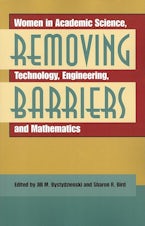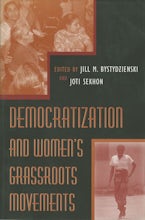- Home
- Removing Barriers
Preparing your PDF for download...
There was a problem with your download, please contact the server administrator.
Removing Barriers
Women in Academic Science, Technology, Engineering, and Mathematics
Edited by Jill M. Bystydzienski and Sharon R. Bird
Published by: Indiana University Press
360 Pages, 1 b&w photos, 6 figures, 1 bibliog., 1 index
- eBook
- 9780253111739
- Published: March 2006
$9.99
Other Retailers:
Movement into academic science, technology, engineering, and mathematics (STEM) fields has been slow for women and minorities. Not only are women and minorities underrepresented in STEM careers, there is strong evidence that many academic departments are resistant to addressing the concerns that keep them from entering careers in these fields. In light of recent controversies surrounding these issues, this volume, examining reasons for the persistence of barriers that block the full participation and advancement of underrepresented groups in the sciences and addressing how academic departments and universities can remedy the situation, is particularly timely. As a whole, the volume shows positive examples of institutions and departments that have been transformed by the inclusion of women and recommends a set of best practices for continuing growth in positive directions.
Acknowledgments
Introduction Jill M. Bystydzienski and Sharon R. Bird
Part I. History of Women in STEM Fields
1. Sustaining Gains: Reflections on Women in Science and Technology in the Twentieth-Century United States Sally Gregory Kohlstedt
2. From "Engineeresses" to "Girl Engineers" to "Good Engineers": A History of Women's U.S. Engineering Education Amy Sue Bix
Part II. Institutional and Cultural Barriers for Women in STEM
3. Using POWRE to ADVANCE: Institutional Barriers Identified by Women Scientists and Engineers Sue V. Rosser
4. Telling Stories about Engineering: Group Dynamics and Resistance to Diversity Cynthia Burack and Suzanne E. Franks
5. The Gender Gap in Information Technology Mo-Yin S. Tam and Gilbert W. Bassett, Jr.
6. African American Women in Science: Experiences from High School through the Post-secondary Years and Beyond Sandra L. Hanson
7. African Women Pursuing Graduate Studies in the Sciences: Racism, Gender Bias, and Third World Marginality Josephine Beoku-Betts
8. Gendered Experiences in the Science Classroom Molly J. Dingel
Part III. Feminist Study of Scientific Practice
9. The Construction of Sexual Bimorphism and Heterosexuality in the Animal Kingdom Kirsten Smilla Ebeling
10. Feminism and Science: Mechanism without Reductionism Carla Fehr
11. Across the Language Barrier: Gender in Plant Biology and Feminist Theory Dana A. Dudle and Meryl Altman
Part IV. Remedies and Change
12. The Graduate Experience of Women in STEM and How It Could Be Improved Anne J. MacLachlan
13. How Can Women and Students of Color Come to Belong in Graduate Mathematics? Abbe H. Herzig
14. Designing Gender-Sensitive Computer Games to Close the Gender Gap in Technology Anna M. Martinson
15. Making Sense of Retention: An Examination of Undergraduate Women's Participation in Physics Courses Heidi Fencl and Karen R. Scheel
16. Creating Academic Career Opportunities for Women in Science: Lessons from Liberal Arts Colleges Neal B. Abraham
17. Beyond Gender Schemas: Improving the Advancement of Women in Academia Virginia Valian
Selected Readings
Contributors
Index
Jill M. Bystydzienski is Director of the Women's Studies Program and Professor of Sociology at Iowa State University.
Sharon R. Bird is Associate Professor of Sociology and an affiliate of the Women's Studies Program at Iowa State University.
"In 2002, a National Science Foundation (and University of Iowa) conference focused on retention of women in academic sciences, technology, engineering, and mathematics (STEM). A main objective was the opportunity to share information and develop possibilities for creating retention initiatives for programs benefiting women and minorities in STEM career paths. This book highlights strong evidence in academia that there is still much resistance to developing women and minority groups for STEM careers. The overall concern is that in the last decade, little progress was made in recruiting and maintaining women in these fields; e.g., of 14,313 US PhDs in 2002, only 353 were African American women, 103 Latinas, and 32 Native American women. This book reviews current barriers to opportunities for participation in the sciences and discusses how academia can address possible solutions, important for academic deans to consider when hiring new faculty. Participants offered understanding of challenges of entering these career fields and at the same time showed how some institutions transformed by including women, and recommended some possible best practices. For women's studies and academic departments interested in diversifying their academic units in STEM areas. An excellent, thought—provoking read. Summing Up: Highly recommended. Upper—division undergraduates through faculty."
~L. L. Morgan, University of Notre Dame, CHOICE, Feb. 2007
"This book reviews current barriers to opportunities for participation in the sciences and discusses how academia can address possible solutions, important for academic deans to consider when hiring new faculty. . . . For women's studies and academic departments interested in diversifying their academic units in STEM areas. An excellent, thought-provoking read. . . . Highly recommended."
~Choice
". . . an interesting and thought-provoking addition to the literature on gender in science.Vol. 114.4 January 2009"
~Catherine Riegle-Crumb, University of Texas, Austin


